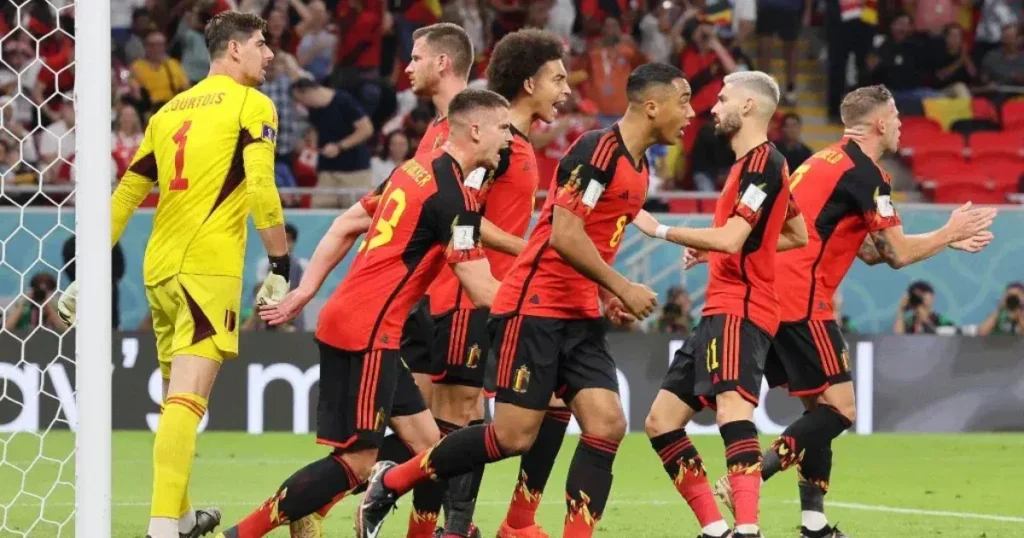The Belgium national football team, affectionately known as the Red Devils, has long been a symbol of passion, resilience, and unexpected brilliance on the international stage. From their humble beginnings over a century ago to becoming a powerhouse in modern European football, this squad has captured the hearts of fans worldwide. Whether you’re a die-hard supporter or a casual observer tuning in for the drama, the Belgium football team delivers moments that blend tactical mastery with raw emotion. In this deep dive, we’ll explore the rich history, standout achievements, iconic players, evolving tactics, recent highs and lows, what’s next on the horizon, the vibrant fan culture, and a promising future outlook. If you’re searching for insights on the Belgium FIFA ranking or the Belgium next match, you’ve come to the right place—let’s kick off!
A Storied History: From Olympic Glory to Global Contenders
The roots of the Belgium football team trace back to May 1, 1904, when they played their inaugural international match—a thrilling 3-3 draw against France in the Évence Coppée Trophy. This game wasn’t just a debut; it marked the birth of competitive football between independent European nations and helped lay the groundwork for FIFA’s formation just weeks later. Governed by the Royal Belgian Football Association (RBFA), co-founders of both FIFA in 1904 and UEFA in 1954, Belgium quickly embraced the sport’s growing popularity.
Early years were marked by regional rivalries, particularly the Low Countries derby against the Netherlands, which began in 1905 and has since produced over 180 clashes. The nickname “Red Devils” emerged in 1906, inspired by their striking red jerseys, and it stuck through triumphs and trials. The 1920 Summer Olympics in Antwerp provided Belgium’s first taste of major success. Hosting the event on home soil, the Red Devils stormed to gold, defeating Czechoslovakia 2-0 in a controversial final amid fog-shrouded drama. Stars like Robert Coppée, who netted a hat-trick against Spain earlier in the tournament, became national heroes.
The interwar period saw consistent participation in tournaments, but World War II halted official play, limiting them to unofficial friendlies against Allied forces. Post-war, the 1950s and 1960s were lean, with only one World Cup appearance (1954) amid a broader struggle against emerging powers in Scandinavia and South America. Yet, talents like Paul Van Himst—Belgium’s “Golden Player” from 1954-2004—kept the flame alive, earning a fourth-place finish at the 1965 Ballon d’Or.
The 1970s and 1980s ushered in Belgium’s first golden era under coach Guy Thys. A heartbreaking miss for the 1974 World Cup—despite a perfect defensive record—fueled determination. By Euro 1980, they reached the final, losing 2-1 to West Germany in a match that ignited national pride. The 1986 World Cup in Mexico remains a pinnacle: semi-finalists after Enzo Scifo’s magic and Jean-Marie Pfaff’s heroics in goal, they finished fourth. This era blended grit with flair, setting the stage for consistent qualifications through the 1990s.
The early 2000s brought a dip, with failures to qualify for 2006 and 2010 World Cups earning the team the mocking moniker “world champions of friendlies.” But a youth revolution sparked by the RBFA’s Generation A-G (Aim, Go, Generation) initiative—focusing on technical skill and 4-3-3 formations—changed everything. By 2014, Belgium was back, reaching World Cup quarter-finals and climbing the ranks. Their story is one of reinvention: from Olympic underdogs to a nation that topped the FIFA rankings without a major trophy, proving depth and development can rival raw talent.
Major Achievements: Bronze Medals, Rankings, and Record-Breaking Runs
While the Belgium football team has yet to lift the World Cup or Euros trophy—a lingering “what if” for fans—their trophy cabinet gleams with milestones that punch above their weight. The 1920 Olympic gold remains their sole major honor, a feat achieved on home turf with a squad blending amateurs and pros. It symbolized Belgium’s early integration into global football, outshining giants like Spain and Sweden.
Fast-forward to the modern era, and the Red Devils’ achievements are quantified in rankings and deep tournament runs. They hold the unique distinction of reaching No. 1 in the FIFA rankings (from 2015-2018 and briefly in 2022) without a World Cup or continental title—a testament to their consistency. At the 2018 World Cup in Russia, they secured third place—their best-ever finish—edging England 2-0 in the playoff, powered by a golden generation that scored 16 goals across six matches.
Euro 1980’s runner-up spot, after topping a group with England and Spain, showcased tactical discipline under Thys. They’ve qualified for 14 World Cups and six Euros, with notable Round of 16 exits in 1990, 1994, 1998, and 2002. The 2022 World Cup quarter-final loss to Croatia stung, but it capped a decade of dominance: unbeaten in qualifiers for Euro 2020 (topping their group) and World Cup 2022.
Individual accolades amplify team success. Romelu Lukaku’s 85 goals make him Belgium’s all-time top scorer, while Thibaut Courtois and Kevin De Bruyne have earned FIFA World Cup best goalkeeper and key player nods, respectively. In 2025, as they navigate transitions, these achievements remind us: Belgium doesn’t just participate—they compete to win.
Key Players: The Heartbeat of the Red Devils
No discussion of the Belgium football team is complete without spotlighting its stars, past and present. The golden generation—Eden Hazard, Kevin De Bruyne, Romelu Lukaku, and Thibaut Courtois—transformed Belgium into a juggernaut. Hazard, with his dazzling dribbles at Chelsea, captained 59 times and sits second on the scoring charts with 33 goals. De Bruyne, Manchester City’s midfield maestro, orchestrates attacks with visionary passes, earning praise as one of the world’s best. Lukaku’s physicality and finishing have netted records, while Courtois anchors the defense with world-class saves.
Historical icons like Van Himst (four Belgian Golden Shoes) and Jan Ceulemans (Euro 1980 captain) laid foundations. The 1986 squad’s Enzo Scifo dazzled with creativity, and Pfaff’s Lev Yashin Award highlighted goalkeeping excellence.
In 2025, with veterans aging, youth injects vitality. Jérémy Doku’s explosive wing play at Manchester City echoes Hazard’s flair, while Amadou Onana’s box-to-box energy in midfield adds steel. Jeremy Minu’s emergence as a versatile defender signals depth. Under new coach Rudi Garcia, these players blend experience with hunger, ensuring the Red Devils remain a threat.
| Key Players | Position | Club (2025) | Caps | Goals | Notable Achievement |
|---|---|---|---|---|---|
| Kevin De Bruyne | Midfielder | Manchester City | 110+ | 30+ | FIFA Best Midfielder (2018) |
| Romelu Lukaku | Striker | Napoli | 120+ | 85 | All-Time Top Scorer |
| Thibaut Courtois | Goalkeeper | Real Madrid | 100+ | 0 | World Cup Best GK (2018) |
| Jérémy Doku | Winger | Manchester City | 40+ | 5 | Euro 2024 Breakthrough Star |
| Amadou Onana | Midfielder | Aston Villa | 30+ | 3 | Nations League Goal Hero |
| Jan Vertonghen | Defender | Anderlecht | 157 | 10 | Most Capped Player |
This table highlights the blend of longevity and promise, helping readers quickly grasp the squad’s backbone.
Tactics: Evolution from Conservative Roots to Fluid Attacks
Tactics have defined the Belgium football team’s journey, evolving from defensive solidity to attacking flair. Early coaches like Raymond Goethals mastered the offside trap in the 1970s, contrasting the Netherlands’ Total Football. Guy Thys’s 4-4-2 in the 1980s emphasized balance, yielding Euro final glory.
Roberto Martínez’s era (2016-2022) revolutionized play with a flexible 3-4-3, leveraging wing-backs like Thomas Meunier for width and De Bruyne’s creativity centrally. Possession-dominant (often 58%+), they prioritized progressive build-up, though critics noted vulnerability to midfield overloads. Domenico Tedesco’s 2023-2025 stint introduced a 4-2-1-3 low build-up, dropping wingers to evade presses, blending pragmatism with dynamism.
Now, under Rudi Garcia (appointed January 2025), Belgium adapts a hybrid 4-3-3/3-4-3, focusing on high pressing and quick transitions. This suits De Bruyne’s vision and Doku’s pace, while maintaining Courtois’s last-line security. Against elite foes, they shift to a compact low block, frustrating attacks before countering lethally. It’s a system built for versatility—defend deep, strike fast—positioning them as tactical chameleons in 2026 World Cup qualifiers.
Recent Results: Resilience Amid Transition
2025 has tested the Red Devils, blending setbacks with signs of revival. After a disappointing Euro 2024 (group stage exit via Ukraine draw) and Nations League struggles under Tedesco—sacked in January—they’ve stabilized. Garcia’s first matches yielded mixed results: a 2-1 friendly win over Ireland in March, but a 1-0 loss to Ukraine in Nations League playoffs (advancing 4-3 aggregate).
World Cup qualifiers kicked off strongly in June: a 3-0 home thrashing of North Macedonia (Lukaku brace) and a gritty 1-1 draw in Wales, maintaining an unbeaten streak in Group J. October brought a 2-2 thriller against Scotland (Doku’s late equalizer) and a 4-1 rout of Poland. As of November 13, their record stands at 379 wins, 180 draws, and 297 losses overall, with 1,541 goals scored.
Challenges persist—aging stars like De Bruyne (34) demand rotation—but recent form (unbeaten in qualifiers) signals momentum. The Belgium FIFA ranking hovers at 6th (post-October update), down from peaks but ahead of rivals like the Netherlands.
| Recent Matches (2025) | Date | Opponent | Result | Competition | Key Moment |
|---|---|---|---|---|---|
| Belgium vs North Macedonia | June 7 | North Macedonia | 3-0 W | WC Qualifier | Lukaku’s Double |
| Wales vs Belgium | June 10 | Wales | 1-1 D | WC Qualifier | Onana Equalizer |
| Belgium vs Scotland | Oct 11 | Scotland | 2-2 D | WC Qualifier | Doku’s Stunner |
| Poland vs Belgium | Oct 14 | Poland | 1-4 W | WC Qualifier | De Bruyne Assist Hat-Trick |
| Ukraine vs Belgium | March 18 | Ukraine | 1-0 L (4-3 agg W) | Nations League Playoff | Aggregate Survival |
This results table offers a snapshot for easy digestion, underscoring their qualifying prowess.
Upcoming Fixtures: Eyes on the Belgium Next Match
Excitement builds for the Red Devils’ slate, with the Belgium next match looming large. On November 15, they face Kazakhstan away in a WC qualifier— a must-win to solidify Group J leadership. Followed by a home clash against Liechtenstein on November 18, these could cement top spot.
2026 brings marquee ties: March visits to Wales, June hosts Kazakhstan, and September derbies versus Scotland and Poland. The Low Countries derby resumes in a March friendly against the Netherlands, reigniting historic fire. With Euro 2028 qualifiers interleaving, Garcia’s men aim for a deep Nations League run. Fans, mark your calendars—these fixtures could define a new era.
Fan Culture: Passion in Black, Yellow, and Red
Belgian fan culture pulses with fervor, divided yet united by the Red Devils. The official supporter group, 1895 (nodding to the RBFA’s founding), boasts over 20,000 members, organizing Fan Days that drew 20,000+ in 2013 and 2014. Chants like “Sweet Caroline” echo at King Baudouin Stadium, home to 50,000 roaring voices, while tifos—massive banners like the 2014 devil depiction—ignite atmospheres.
Yet, it’s nuanced: Flemish-Walloon divides mean club loyalties (Anderlecht, Club Brugge) often eclipse national fervor, with hooliganism more club-tied than international. Golden generation success exploded popularity—Euro 2016’s Hungary match drew 4 million viewers, a record. Pubs overflow for games, streets flood with red flares, and landmarks like Manneken Pis don team kits during tournaments.
Critics note fickleness—boos after lackluster draws, like Euro 2024’s Ukraine stalemate—but loyalty shines in loyalty programs like “Colour Belgium Red.” It’s a culture of conditional love: explosive support when winning, introspective when not, but always deeply felt.
Future Outlook: Transitioning to a New Golden Dawn
As 2025 closes, the Belgium football team’s future gleams with cautious optimism. The Belgium FIFA ranking at 6th reflects a post-golden generation shift, but Garcia’s arrival promises tactical renewal. With 2026 World Cup qualifiers underway (top of Group J), qualification seems assured, potentially marking De Bruyne’s swan song.
Youth integration is key: talents like Doku, Onana, and Romeo Vermant (debut 2025) blend seamlessly, backed by RBFA’s academy pipeline. Challenges? Defensive depth post-Vertonghen and injury-prone stars. Yet, their 1,442 days at No. 1 prove pedigree. By Euro 2028, expect a refreshed squad challenging for silverware—perhaps ending the drought. The Red Devils aren’t fading; they’re evolving, ready to devil opponents anew.
In a landscape dominated by Brazil and France, Belgium’s story inspires: small nation, big dreams. Whether dissecting the Belgium next match or celebrating their legacy, one thing’s clear—the Red Devils endure. What’s your favorite Red Devils memory? Share in the comments!






